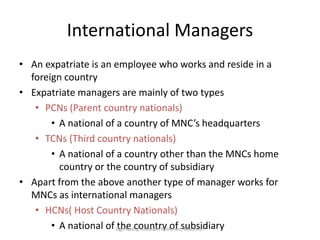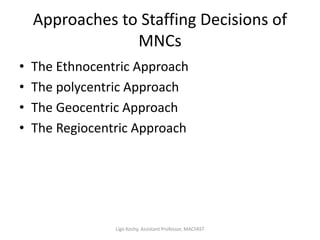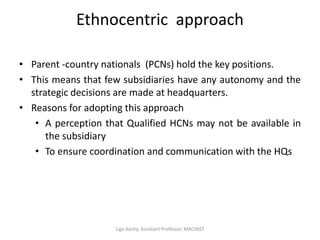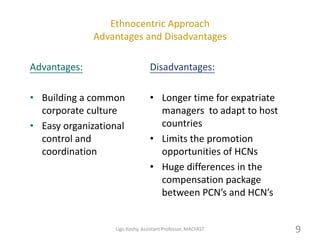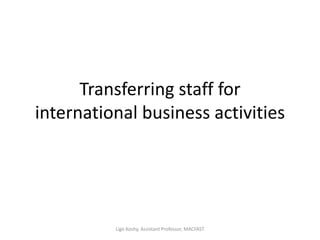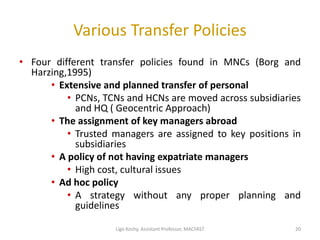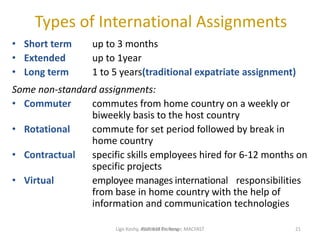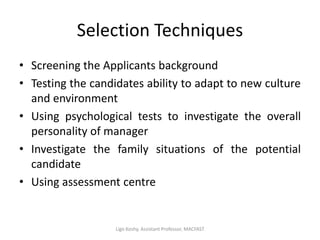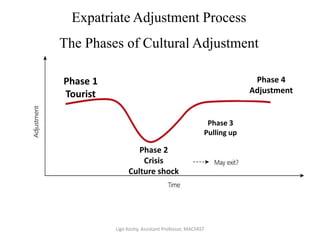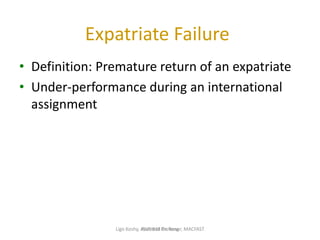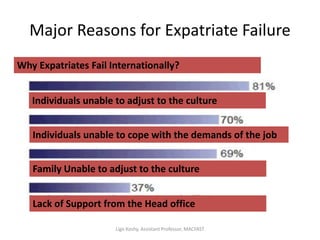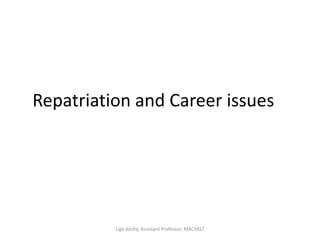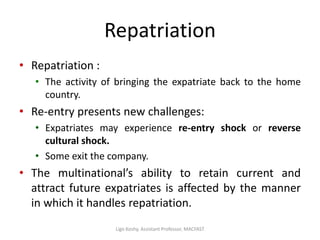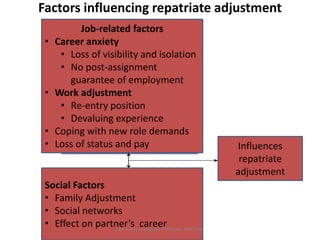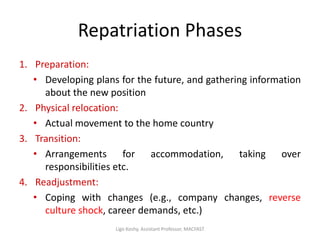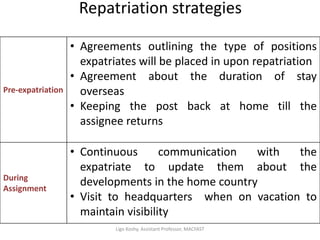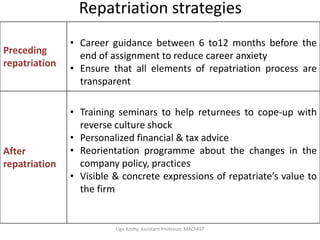International staffing
- 1. International Staffing Ligo Koshy, Assistant Professor, MACFAST
- 2. International Managers • An expatriate is an employee who works and reside in a foreign country • Expatriate managers are mainly of two types • PCNs (Parent country nationals) • A national of a country of MNC’s headquarters • TCNs (Third country nationals) • A national of a country other than the MNCs home country or the country of subsidiary • Apart from the above another type of manager works for MNCs as international managers • HCNs( Host Country Nationals) • A national of the country of subsidiaryLigo Koshy, Assistant Professor, MACFAST
- 3. Advantages and Disadvantages of using PCNs Advantages: • Familiarity with the corporate office goals, objectives, policies and practices • Easy organizational control and coordination • Has the required level of competence • Building a common corporate culture Disadvantages: • Longer time for PCNs to adapt to host countries • Limited promotional opportunities for HCNs • Tendency of PCN’s to impose HQ style • Excessive cost of selecting , training and maintaining expatriate managers and their families abroad • Huge differences in the compensation package between PCN’s and HCN’s 3Ligo Koshy, Assistant Professor, MACFAST
- 4. Advantages and Disadvantages of employing TCNs Advantages: • Salary and benefits requirements may be lower than of PCN’s. • TCNs may be better informed than PCNs about the host country assignments Disadvantages: • Host country government may resent hiring TCN’s • TCNs may not want to return to their own countries after assignment • Transfers must consider possible national animosities. 4Ligo Koshy, Assistant Professor, MACFAST
- 5. Advantages and Disadvantages of using HCNs Advantages: • Familiarity with the socio economic and with the business practices in host country • Lower cost incurred in hiring compared to PCNs and TCNs • Responds effectively to host country’s demand for localization • Language and other barriers are eliminated • Continuity of management improves since HCNs stay longer in positions • Reduction in hiring costs and elimination of work permit requirements Disadvantages: • Difficulty in exercising control over the subsidiary’s operations • Communication difficulties in dealing with corporate headquarters. • Lack of opportunities for PCNs to gain international and cross- cultural experience • HCN’s have limited career opportunity outside the subsidiary 5Ligo Koshy, Assistant Professor, MACFAST
- 6. Why international staffing? • Company motives • Fill positions • Management development • Organisational Development • Individual motives • To gain job experience • Better compensation • Improved lifestyle abroad • Possibility of advancement upon return Ligo Koshy, Assistant Professor, MACFAST
- 7. Approaches to Staffing Decisions of MNCs • The Ethnocentric Approach • The polycentric Approach • The Geocentric Approach • The Regiocentric Approach Ligo Koshy, Assistant Professor, MACFAST
- 8. Ethnocentric approach • Parent -country nationals (PCNs) hold the key positions. • This means that few subsidiaries have any autonomy and the strategic decisions are made at headquarters. • Reasons for adopting this approach • A perception that Qualified HCNs may not be available in the subsidiary • To ensure coordination and communication with the HQs Ligo Koshy, Assistant Professor, MACFAST
- 9. Ethnocentric Approach Advantages and Disadvantages Advantages: • Building a common corporate culture • Easy organizational control and coordination Disadvantages: • Longer time for expatriate managers to adapt to host countries • Limits the promotion opportunities of HCNs • Huge differences in the compensation package between PCN’s and HCN’s 9Ligo Koshy, Assistant Professor, MACFAST
- 10. Polycentric Approach • Polycentric approach uses host-country nationals(HCNs) to staff the subsidiary while parent country nationals hold positions at headquarters. • In this context, the multinational enterprise treats each subsidiary as a distinct national entity with some decision making autonomy. • Local nationals who are seldom promoted to positions at headquarters manage subsidiaries. Ligo Koshy, Assistant Professor, MACFAST
- 11. Polycentric Approach Advantages: • Familiarity with the socio economic, political and legal environment and with the business practices in host country • Lower cost incurred in hiring compared to PCNs and TCNs • Responds effectively to host country’s demand for localization • Language and other barriers are eliminated • Continuity of management improves since HCNs stay longer in positions Disadvantages: • Difficulty in exercising control over the subsidiary’s operations • Communication difficulties in dealing with corporate headquarters. • Lack of opportunities for PCNs to gain international and cross- cultural experience • HCN’s have limited career opportunity outside the subsidiary 11Ligo Koshy, Assistant Professor, MACFAST
- 12. Geocentric approach • The subsidiary operations are managed by the best qualified individuals regardless of their nationality • Subsidiaries may choose managers from the host country, from the home country or from a third country. Ligo Koshy, Assistant Professor, MACFAST
- 13. Geocentric Approach Advantages and Disadvantages Advantages: • Facilitates the development of an international team • Supports cooperation and resource sharing across units. Disadvantages: • Immigration controls and work permits for the foreign manager and his family • High Training and relocation cost • Devising an appropriate compensation structure will be complex • More centralized control over staffing and loss of autonomy by the subsidiary in HRM issues 13Ligo Koshy, Assistant Professor, MACFAST
- 14. Regiocentric approach • Managers are transferred within the same region they work. • In this approach, regional managers may not be promoted to Headquarters positions but enjoy a degree of regional autonomy in decision making. • Eg: for global firm having a number of subsidiaries in various regions like Asia-Pacific, European and U.S, a manager working in Asia pacific region will be moving within the same region only. Ligo Koshy, Assistant Professor, MACFAST
- 15. Regiocentric Approach Advantages and Disadvantages Advantages: • More sensitivity to local conditions • Allows interaction between executives transferred to regional headquarters from subsidiaries in the region and PCNs posted in the regional headquarters. • Paves the way for adoption of a geocentric approach Disadvantages: • Improves career opportunities at the regional, but not international level • Factors such as political animosity (India and Pakistan)between regional countries and work permit requirements must be taken into consideration 15Ligo Koshy, Assistant Professor, MACFAST
- 16. Factors favouring PCNs or HCNs A Parent Country Characteristics Cultural distance between parent unit and subsidiary , size of operations B Industry Characteristics Need for control, need to customise C Subsidiary Characteristics Stages of subsidiary lifecycle, Acquired or greenfield project, performance , ownership pattern D Host Country characteristics Education level, political conditions, cost of living Ligo Koshy, Assistant Professor, MACFAST
- 17. Linkage between Staffing and stages in Host units lifecycle of MNC’s Stage in Host Unit’s life cycle Staffing Focus Hiring headcounts Staffing Approach Role of Parent MNC Setting up the host unit (0 to 9-12months) Top and Senior management positions Normally 5- 20 Ethnocentric / Geocentric approach Closely and carefully monitored by the parent MNC Establishing the technology team to begin core operations activities (6months – 1.5 years) High quality technical competent employees 20-200 Polycentric / Ethnocentric Role of Parent unit is somewhat reduced Ligo Koshy, Assistant Professor, MACFAST
- 18. Linkage between Staffing and stages in Host units lifecycle of MNC’s Stage in Host Unit’s life cycle Staffing Focus Hiring headcounts Staffing Approach Role of Parent MNC Full blown operations of the host unit (1.5 -3yrs) Hiring targets get aggressive Varies between 200- 500 Polycentric approach. Role of parent country is minimal. Strong Operational leadership at the unit level while globally consolidating with Parent Establishing long term liaisons with educational training institutions Between 500- 10000 depending upon nature of the business. Polycentric or geocentric Approach Role of Parent unit is at a strategic level, taking decisions to optimize global operating costs. Ligo Koshy, Assistant Professor, MACFAST
- 19. Transferring staff for international business activities Ligo Koshy, Assistant Professor, MACFAST
- 20. Various Transfer Policies • Four different transfer policies found in MNCs (Borg and Harzing,1995) • Extensive and planned transfer of personal • PCNs, TCNs and HCNs are moved across subsidiaries and HQ ( Geocentric Approach) • The assignment of key managers abroad • Trusted managers are assigned to key positions in subsidiaries • A policy of not having expatriate managers • High cost, cultural issues • Ad hoc policy • A strategy without any proper planning and guidelines 20Ligo Koshy, Assistant Professor, MACFAST
- 21. Types of International Assignments • Short term up to 3 months • Extended up to 1year • Long term 1 to 5 years(traditional expatriate assignment) Some non-standard assignments: • Commuter commutes from home country on a weekly or biweekly basis to the host country • Rotational commute for set period followed by break in home country • Contractual specific skills employees hired for 6-12 months on specific projects • Virtual employee manages international responsibilities from base in home country with the help of information and communication technologies IBUS 618 Dr. Yang 21Ligo Koshy, Assistant Professor, MACFAST
- 22. Roles of an Expatriate 22 Agent of direct control Agent of socialising Network builder Transfer of competence and knowledge Boundary spanner Language node Roles of an Expatriate Ligo Koshy, Assistant Professor, MACFAST
- 23. Recruiting & Selecting for International Assignments Ligo Koshy, Assistant Professor, MACFAST
- 24. International vs. domestic recruitment • Staffing approach of MNC( ethnocentric, polycentric, geocentric & Regiocentric) • Constraints imposed by the host government( immigration, work visa) • Preference for internal recruitment » To reduce selection risk • Smaller number of external recruits Ligo Koshy, Assistant Professor, MACFAST
- 25. Recruitment Methods • Using Head hunters • Headhunter, an informal name for an employment recruiter/Agency, sometimes referred to as executive searcher . • For top management positions • Cross national advertising • E-recruitment • International graduate program • Training program that last approximately 2 years and aim at finding, training and developing university graduates in to future managers • The training is done in different countries shifting trainees in different unitsLigo Koshy, Assistant Professor, MACFAST
- 26. Factors influencing Expatriate Selection Technical / Managerial Competency Cross-cultural suitability/ Personal Attributes Family Requirements Country/ cultural requirements Language MNE/ Company Requirements Individual Situation Ligo Koshy, Assistant Professor, MACFAST
- 27. 27 Mendenhall and Oddou Four Dimensional Framework for expat selection : Self Orientation The degree to which the expatriate expresses high self-esteem, self- confidence and mental well being Others Orientations The degree to which the expatriate is concerned about host national co-workers and desire to affiliate with them Perceptual Dimension The expertise the expatriate possesses in accurately understanding why host nationals behave the way they do. Cultural Toughness Dimension The degree to which the culture of the host country is incongruent with that of the home country. The evaluation of the candidates strength's and weakness on these 4 dimensions focuses on cross cultural ability thus complementing technical ability Ligo Koshy, Assistant Professor, MACFAST
- 28. Selection Techniques • Screening the Applicants background • Testing the candidates ability to adapt to new culture and environment • Using psychological tests to investigate the overall personality of manager • Investigate the family situations of the potential candidate • Using assessment centre Ligo Koshy, Assistant Professor, MACFAST
- 29. Tasks and Exercises used in an assessment center for Expatriate selection Exercises/ Tasks Tolerance for ambiguity Interpersonal skills Empathy Non- judgementalism Flexibility Role-play Questionnai re Group Discussion Presentation Case study Activities are aimed at measuring the the intercultural competency of the candidate Ligo Koshy, Assistant Professor, MACFAST
- 30. Interviews for international Recruitment- issues • Stereotyping • Cross cultural differences • Non verbal bias Ligo Koshy, Assistant Professor, MACFAST
- 31. International staffing: Other issues • Expatriate adjust process • Expatriate failure • Repatriation • Inpatriation • Recent trends in international staffing Ligo Koshy, Assistant Professor, MACFAST
- 32. Expatriate Adjustment Process The Phases of Cultural Adjustment Phase 1 Tourist Phase 4 Adjustment Phase 3 Pulling up Phase 2 Crisis Culture shock Ligo Koshy, Assistant Professor, MACFAST
- 33. Expatriate Failure • Definition: Premature return of an expatriate • Under-performance during an international assignment IBUS 618 Dr. YangLigo Koshy, Assistant Professor, MACFAST
- 34. Major Reasons for Expatriate Failure Why Expatriates Fail Internationally? Individuals unable to adjust to the culture Individuals unable to cope with the demands of the job Family Unable to adjust to the culture Lack of Support from the Head office Ligo Koshy, Assistant Professor, MACFAST
- 35. Repatriation and Career issues Ligo Koshy, Assistant Professor, MACFAST
- 36. Knowledge & skills acquired from international assignment • Market specific knowledge local systems (political, social, economic), language, customs • Personal skills inter-cultural knowledge, self-confidence, flexibility, tolerance • Job-related management skills communication, project management, problem-solving • Network knowledge meeting diverse people • General management capacity broader job responsibilities, exposure to other parts of the organization
- 37. Repatriation • Repatriation : • The activity of bringing the expatriate back to the home country. • Re-entry presents new challenges: • Expatriates may experience re-entry shock or reverse cultural shock. • Some exit the company. • The multinational’s ability to retain current and attract future expatriates is affected by the manner in which it handles repatriation. Ligo Koshy, Assistant Professor, MACFAST
- 38. Factors influencing repatriate adjustment Job-related factors • Career anxiety • Loss of visibility and isolation • No post-assignment guarantee of employment • Work adjustment • Re-entry position • Devaluing experience • Coping with new role demands • Loss of status and pay Social Factors • Family Adjustment • Social networks • Effect on partner’s career Influences repatriate adjustment Ligo Koshy, Assistant Professor, MACFAST
- 39. Repatriation Phases 1. Preparation: • Developing plans for the future, and gathering information about the new position 2. Physical relocation: • Actual movement to the home country 3. Transition: • Arrangements for accommodation, taking over responsibilities etc. 4. Readjustment: • Coping with changes (e.g., company changes, reverse culture shock, career demands, etc.) Ligo Koshy, Assistant Professor, MACFAST
- 40. Repatriation strategies Pre-expatriation • Agreements outlining the type of positions expatriates will be placed in upon repatriation • Agreement about the duration of stay overseas • Keeping the post back at home till the assignee returns During Assignment • Continuous communication with the expatriate to update them about the developments in the home country • Visit to headquarters when on vacation to maintain visibility Ligo Koshy, Assistant Professor, MACFAST
- 41. Repatriation strategies Preceding repatriation • Career guidance between 6 to12 months before the end of assignment to reduce career anxiety • Ensure that all elements of repatriation process are transparent After repatriation • Training seminars to help returnees to cope-up with reverse culture shock • Personalized financial & tax advice • Reorientation programme about the changes in the company policy, practices • Visible & concrete expressions of repatriate’s value to the firm Ligo Koshy, Assistant Professor, MACFAST
- 42. Inpatriation • Involves the transfer of subsidiary manager to the headquarters for specific period of time • Helps in gaining knowledge about the corporate work culture and build communication network Ligo Koshy, Assistant Professor, MACFAST
- 43. Recent Trends in International staffing • Offshoring • Dual career couples • Female expats Ligo Koshy, Assistant Professor, MACFAST
- 44. 44 Recent trends in International staffing Offshoring • Offshoring is the relocation of a business process from one country to another—typically an operational process, such as manufacturing, or supporting processes, such as accounting. • Outsourcing country, usually in the developed economies, stands to loose jobs to low cost and high skills countries. Ligo Koshy, Assistant Professor, MACFAST
- 45. 45 Recent trends in International staffing Managing Dual career couples • Find a job for the trailing spouse/ job hunting assistance • Commute/remote assignments/commuter marriages • The spouse remain in the home country and the couple works out ways to maintain relationship with the help of organisation. • The help from the employer is in the form of subsidized telephone bills and air tickets. • Intra-company employment • Inter-firm networking • On assignment career support Ligo Koshy, Assistant Professor, MACFAST
- 46. Female expats • 18% of total Expat population constitute of females • Causes for less number of female expats • Stereotyping – Less capabilities and skills to cope up with stress • Host country attitudes • Family Constraints • Lack of motivation to work in foreign locations Ligo Koshy, Assistant Professor, MACFAST

